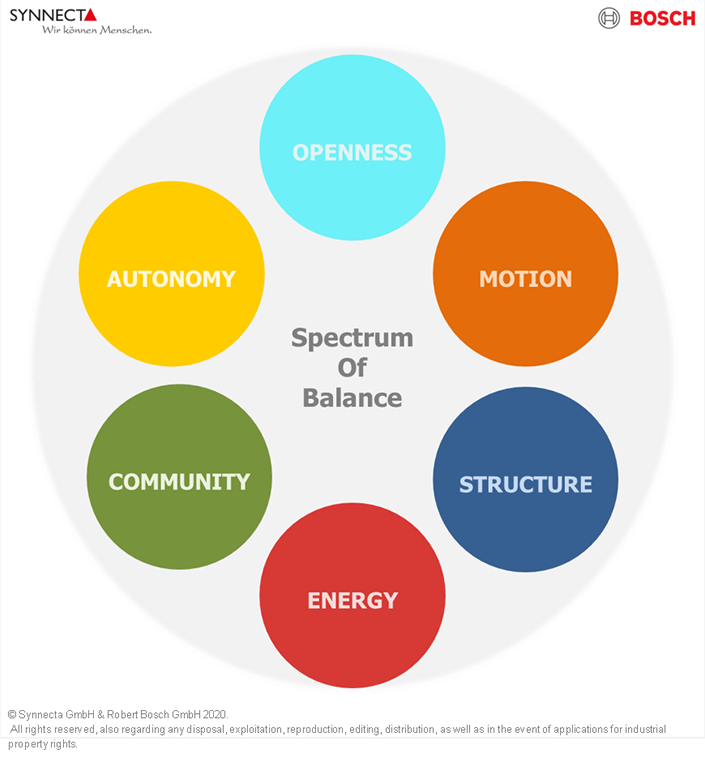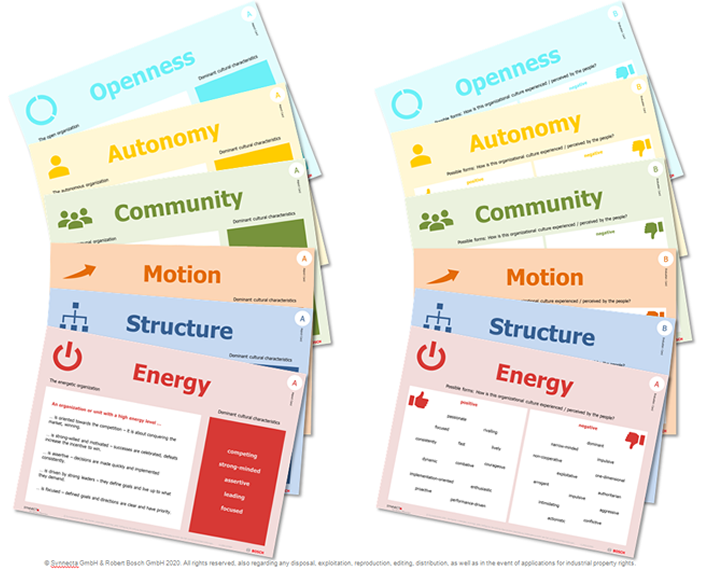The cultural model »Spectrum of Balance« was developed by SYNNECTA in co-creation with partners at other companies. It gives culture a language and thus people in organizations a basis for reflection and discussion. The model is descriptive and not normative. It is easy to understand and can be used in a simple and flexible way. It is available in German as well as in English, now.

At the beginning of a transformation process in an industrial company with more than 30,000 employees, the CEO emphasized: 50% of the success is due to the reorganization and the implementation of the new strategy, but 50% lies in the transformation of the corporate culture! Peter Drucker with his statement »Culture eats strategy for breakfast« sends his regards.
Now, from our point of view, it makes only little sense to set up and implement culture transformation as another change project, according to the principle: 1) analyze current culture, 2) define »to be« culture and 3) implement (s. also blog »Mission Statements in Times of hybrid Societies«). Why?
On the one hand, culture is omnipresent and manifests permanently in our feelings, thoughts and actions and thus in communication, cooperation, and leadership of organizations. On the other hand, culture is intangible, constantly in flux and its effects are often not consciously perceived by people. Much is hidden and part of the relationships. Personal perception and interpretation by individuals and social groups have an impact on experiencing the culture, too. Finally, the context plays an important role. As a result, there is neither »the« or »the right« culture for everyone in an organization, nor can culture be transformed in a mechanistical manner.
It is most appropriate to recognize and understand culture and cultural patterns by reflecting and discussing it with others. This requires words and a common language as well as possibilities to state differences. There are already many cultural models that can be used for this exercise. However, they often use a normative approach (e.g., Spiral Dynamics or the model described by F. Laloux in »Reinventing Organizations«).
Rüdiger Müngersdorff therefore designed a non-normative cultural model based on five cultural aspects or dimensions, which was elaborated in an internal SYNNECTA project group. It can be used in discussions with individuals and small groups on an ad hoc basis or in a more structured way in workshops and large-scale events. In the context of a cultural transformation process, it may serve as a basic model. It can be customized in terms of content and language as well as methods and processes. We have already gathered many positive experiences with its usage in various organizations.
In addition, we further developed the model with partners (see below) from various HR and OD departments of the Bosch Group. After several iteration loops, the »Spectrum of Balance« cultural model consists of six cultural aspects:
- Openness (aqua)
- Autonomy (yellow)
- Community (green)
- Motion (orange)
- Structure (blue)
- Energy (red)

To each aspect or dimension an aspect card give a concise description of the content and an evaluation card sketches possible expressions, how people may experience the respective aspect in a positive (healthy) or in a negative (unhealthy) way.

Furthermore, the original model includes change cards, which provide initial ideas and indications of what can be done, to strengthen a particular cultural aspect in an organization, depending on the current situation / cultural balance.
The model has been used in workshops, large scale events as well as so-called Open Office events. Therefore, different scripts are available.
Thomas Meilinger
Our co-creative development partners: Germán Barona (Bosch Corporate – Leadership, Learning and Organization Culture), Harald Baumann (Bosch Rexroth, Deployment Business Excellenz), Benjamin Berger (Bosch Powertrain Solutions, Divisional Business Transformation), Laura Heim (Bosch Corporate – Leadership, Learning and Organization Culture), Sybille Payer (ETAS GmbH, Personell and Organizational Development), Anna Prieschl (ETAS GmbH, Personell and Organizational Development). Photo: Paul Hanaoka by unsplash.com
